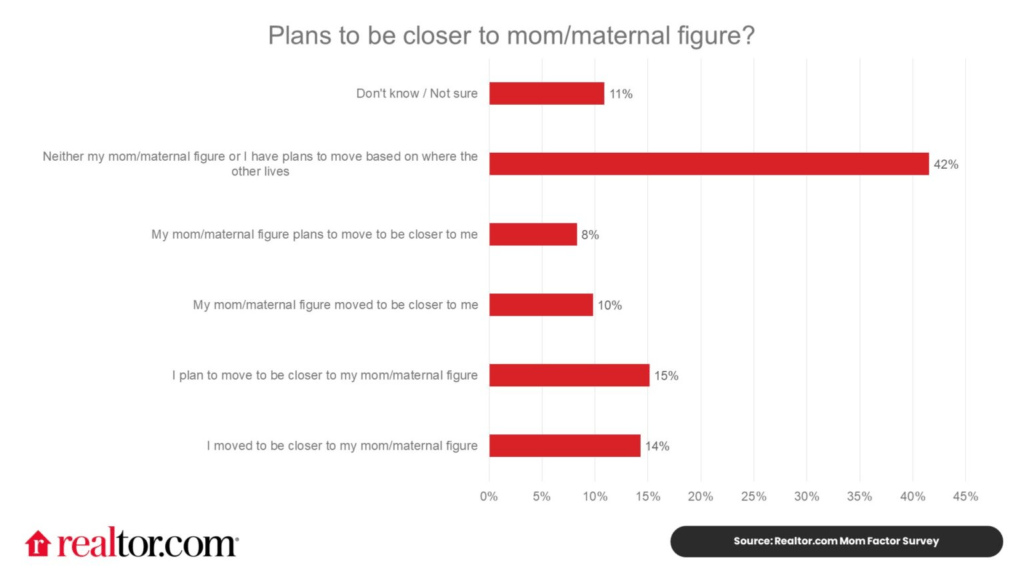A recent survey by Realtor.com digs into how America’s mom factor which influence real estate buying decisions. Home shoppers aim to balance a wide range of considerations when choosing where to live.
Many buyers prioritize proximity to family, especially their mothers, in their decisions. A staggering three-quarters of surveyed Americans prefer living close to their moms.
Moreover, nearly half of American adults (47%) have either relocated or intend to relocate themselves or their mother to be nearer to each other. Specifically, 14% have already moved closer to their mother or maternal figure. While 15% are planning such a move. Additionally, 10% report their mother or maternal figure has relocated to be closer to them, and 8% mention their mother or maternal figure plans to do so.

The pull of moms means that almost two-thirds of Americans responded that where their mom lives impacts where they choose to live. 65% would move closer to their mom if they could.
Moreover, among respondents who relocated to be nearer to their mothers, 29% purchased or rented a new home nearby. Wile 20% moved in with their mothers. Additionally, 19% mentioned that their mothers bought or rented a residence near them. And 13% stated that their mothers moved in with them.

Among those who intend to make moves to be closer to mom, one-third (31%) plan to buy or rent a new home near their moms. While 16% say they’ll buy or rent a new home together. Many homebuyers and homeowners take their moms into consideration when making housing choices.

While housing costs remain high, moving in together with mom or renting her a place nearby can be a great option both financially and to achieve your desired proximity.
The Desi Buzz Spoke with some South Asians across USA to understand why they choose to stay with or near family members. In fact the trend of staying with or near family is seen across Muslim community, Arab community, Latino community & Asian community.
The Advantages of South Asian Americans Staying with or Near Family Members
In the fabric of South Asian American culture, family occupies a central, cherished place. Rooted in strong familial bonds and a collective ethos, many South Asian Americans actively seek to stay close to their family members or even live under the same roof. This cultural practice, deeply ingrained in tradition, offers a multitude of advantages that extend beyond mere proximity.
Cultural Continuity and Connection
By living with or near family members, South Asian Americans can maintain a strong connection to their cultural heritage. Family becomes a living repository of traditions, language, customs, and values, ensuring that these elements are passed down through generations.
Social Support and Emotional Well-being
In times of joy or adversity, family serves as a reliable source of support and comfort. Living in close proximity allows for immediate access to emotional support networks, fostering a sense of belonging, security, and emotional well-being.
Shared Responsibilities and Collaborative Living
Multigenerational living or living near family members often entails shared responsibilities and collaborative decision-making. From childcare and household chores to financial planning and caregiving for elderly relatives, family members can pool their resources, skills, and experiences, lightening individual burdens and fostering a sense of communal living.
Radha Krishnan from Dallas said “That living near family members is helpful as the children can meet their cousins on a regular basis. Also, parents can meet their children and grandchildren daily as it happens back home.”
Economic Benefits
In the face of rising housing costs and economic uncertainties, living with or near family members can offer significant financial advantages. Shared living arrangements can result in reduced expenses through cost-sharing for rent or mortgage payments, utilities, groceries, and other household expenditures. Moreover, pooling financial resources may enable families to afford larger homes or properties in desirable neighborhoods that might otherwise be financially out of reach.
Amjad Sheikh, from Chicago said “Staying near family is very practical, as we can go to grocery together, buy in bulk and save. We get to eat wide variety of food
Preservation of Family Values and Traditions
Living in close proximity to family members facilitates the transmission of family values, cultural practices, and religious traditions. Children growing up in such environments benefit from exposure to multiple generations, gaining a deeper understanding and appreciation of their heritage.
Noreen Akhtar, Minnesota said that “As her mother stays nearby and sometimes with her, her daughter Eeman enjoys company with her Nanah (maternal grandmother), she watches Punjabi movies with and she is able to understand Punjabi (as they from Multan).
Elderly Care and Support
In South Asian cultures, respect for elders and intergenerational care are deeply ingrained principles. Living with or near elderly parents or relatives enables families to provide personalized care and support as they age, ensuring their physical, emotional, and social well-being.
Charmika Ehepola, New York, said “My parents are getting old, as we all siblings stay nearby, so we can take care of our aging parents. They feel comfortable and happy when they see all their children with them”.
Enhanced Quality of Life
Multigenerational living or living near family members can enrich daily life by fostering a sense of community, shared experiences, and mutual respect. From shared meals and celebrations to cultural events and religious ceremonies, family-centric living promotes a sense of unity, joy, and fulfillment.
In essence, for many South Asian Americans, staying with or near family members is not merely a matter of convenience but a deliberate choice grounded in cultural values, familial ties, and a shared sense of identity. In a fast-paced world marked by constant change, embracing these traditions offers a sense of continuity, stability, and belonging that enriches both individual lives and the broader community.
About the Author
Dr. Tausif Malik is a social entrepreneur, publisher, and academician, renowned for his innovative ventures. He founded and publishes The Desi Buzz, GCC Startup News, Startup Berita, and Halal Biz News, amplifying entrepreneurship globally. Dr. Malik also spearheads AIMBSN, Halal Angels Network, and Startup Villages, fostering startup ecosystems. His groundbreaking initiative, RiseBack.org, offers affordable edtech solutions, providing Indian university programs starting at $50 per month and professional IT courses priced at $250-$350. Through his diverse endeavors, Dr. Malik empowers individuals with access to education and opportunities.


